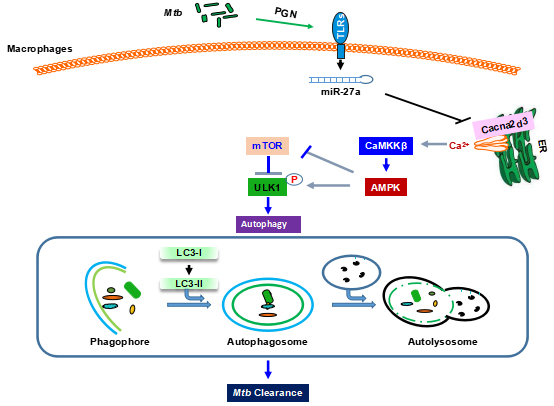On Oct. 16, Prof. Ge Baoxue’s team from
Tongji University School of Medicine and Shanghai Pulmonary Hospital affiliated
to Tongji University, published their research in Nature Communications that
Mycobacterium tuberculosis inhibits endoplasmic calcium ion channel protein
CACNA2D3 in host macrophages by upregulating expression of miR-27a and thus
reduces calcium signal dependent autophagy to facilitate survival and infection
of Mycobacterium tuberculosis.
To explore novel mechanisms of Mycobacterium
tuberculosis infection and pathogenesis, Prof. Baoxue Ge’s team conducted
in-depth sequencing of macrophages infected by Mycobacterium tuberculosis and
other samples from Mycobacterium tuberculosis infected mice and patients. They
found that Mycobacterium tuberculosis infection dramatically upregulates
expression of miR-27a, which significantly inhibits autophagy and promotes
survival of Mycobacterium tuberculosis and exacerbation of tuberculosis.
Further study showed that miR-27a targets endoplasmic ion channel CACNA2D3 and
inhibits expression of CACNA2D3 gene, disrupting calcium signals and autophagy
pathway in host cells and facilitating survival and infection of Mycobacterium
tuberculosis. Finally, inhibitors of miR-27a effectively ameliorated
pathological pulmonary lesion caused by Mycobacterium tuberculosis infection
and reduced pulmonary bacteria load. This work revealed a novel immune
evasion pathway that Mycobacterium tuberculosis inhibits calcium signal
dependent autophagy by inducing host miR-27a as theoretical foundation of
tuberculosis diagnosis and therapy. Meanwhile, an inhibitor of miR-27a as a
novel anti-tuberculosis drug is in process of patent filing and development.
The first authors are Dr. Liu Feng,
research assistant Jianxia Chen and attending physician Wang Peng from Shanghai
Pulmonary Hospital. The correspondence author is Prof. Ge Baoxue from Shanghai
Pulmonary Hospital.
Prof. Ge Baoxue is Director of Shanghai Key
Lab of Tuberculosis. The lab relies on Shanghai Pulmonary Hospital affiliated
to Tongji University and focuses on basic and clinical translational research
of tuberculosis prevention, diagnosis and therapy. This work was supported by National
Basic Research Program of China, Key Program and Major Research Program of NNSF
and Key Clinical Discipline Construction Program of Shanghai Municipality


Link:https://www.nature.com/articles/s41467-018-06836-4
